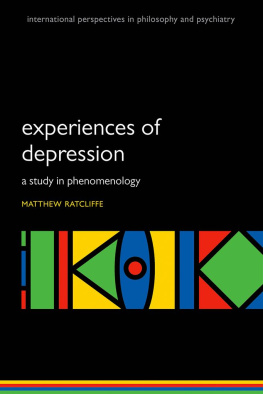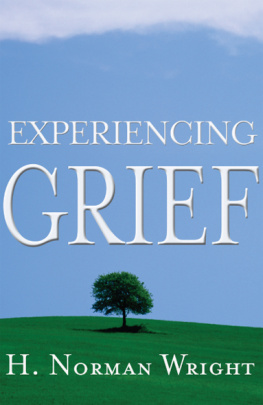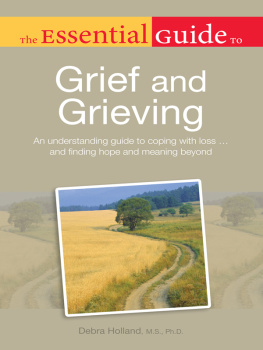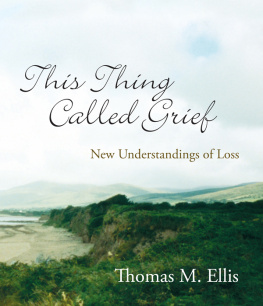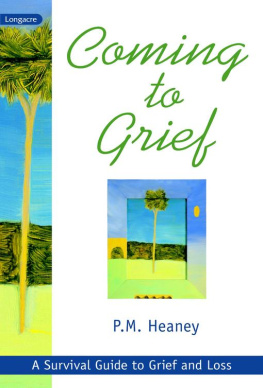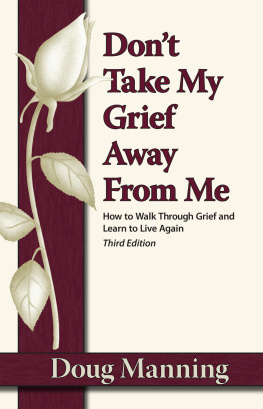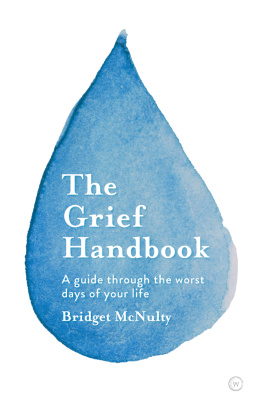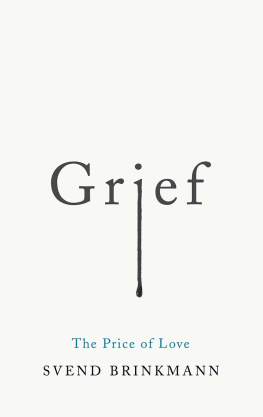Contents
Guide
Pagebreaks of the print version
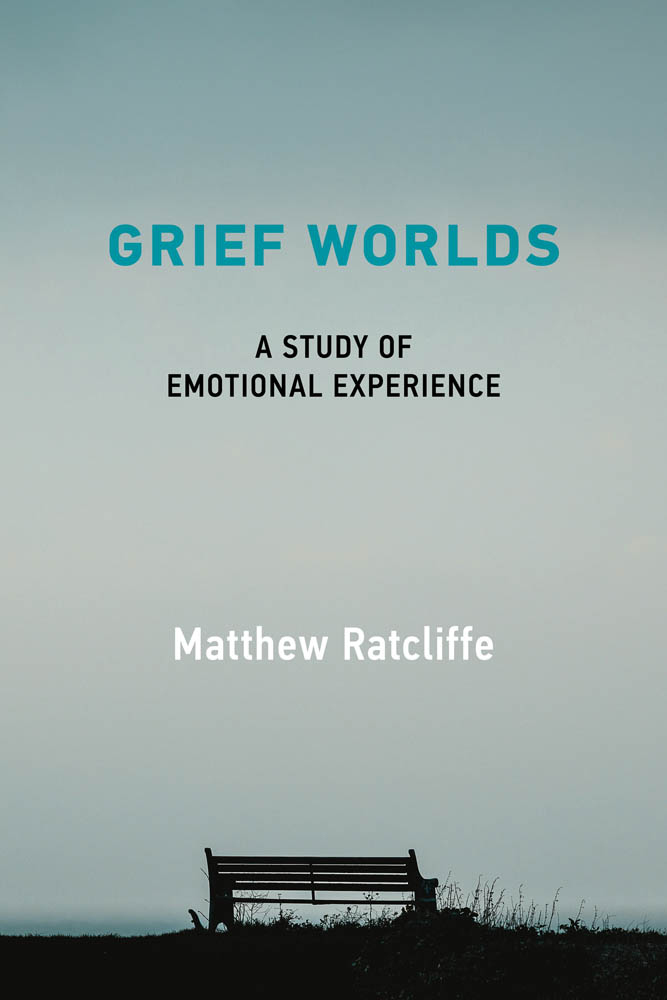
Grief Worlds
A Study of Emotional Experience
Matthew Ratcliffe
The MIT Press
Cambridge, Massachusetts
London, England
2022 Massachusetts Institute of Technology
This work is subject to a Creative Commons CC-BY-ND-NC license.
Subject to such license, all rights are reserved.

The MIT Press would like to thank the anonymous peer reviewers who provided comments on drafts of this book. The generous work of academic experts is essential for establishing the authority and quality of our publications. We acknowledge with gratitude the contributions of these otherwise uncredited readers.
Library of Congress Cataloging-in-Publication Data
Names: Ratcliffe, Matthew, 1973 author.
Title: Grief worlds : a study of emotional experience / Matthew Ratcliffe.
Description: Cambridge, Massachusetts : The MIT Press, [2022] | Includes bibliographical references and index.
Identifiers: LCCN 2022004533 (print) | LCCN 2022004534 (ebook) | ISBN 9780262544801 (paperback) | ISBN 9780262372602 (epub) | ISBN 9780262372619 (pdf)
Subjects: LCSH: Grief. | Bereavement.
Classification: LCC BF575.G7 R38 2023 (print) | LCC BF575.G7 (ebook) | DDC 152.4dc23/eng/20220621
LC record available at https://lccn.loc.gov/2022004533
LC ebook record available at https://lccn.loc.gov/2022004534
d_r0
Contents
Acknowledgments
This book was written as part of the four-year research project Grief: A Study of Human Emotional Experience (20202023). I am very grateful to the UK Arts and Humanities Research Council for funding this project (grant reference: AH/T000066/1). I would like to thank my project colleagues, Louise Richardson, Becky Millar, Emily Hughes, and Ellie Byrne, for all their helpful feedback, encouragement, and advice. I am also grateful to several other colleagues at the University of York, who have supported our research on grief in one or another way. They include Keith Allen, Bryony Beresford, James Clarke, the late David Efird, Julia Hackett, Julie Kay, Paul Noordhof, Ruth Penfold-Mounce, Julie Rugg, Tom Stoneham, Alan Thomas, and Lillian Wilde. As part of the project, we undertook a qualitative survey of grief experiences, to which 265 people responded. I would like to thank all of them for taking the time to complete the survey, giving our questions such careful thought, and sharing their experiences with us. Their testimonies were immensely informative, and I draw on them throughout this book. I am also grateful to the charity Cruse Bereavement Care for advising us on the design of the survey and assisting with its dissemination.
I was steered toward the topic of grief from several directions. Work I had done on depression, trauma, the sense of time, interpersonal experience, hallucination, emotional feeling, and emotion regulation all pointed this way. My thinking has been helped along by conversations and email exchanges with many people, including Thomas Attig, Anna Bortolan, Matthew Broome, Luke Brunning, Havi Carel, Michael Cholbi, Jonathan Cole, Giovanna Colombetti, Rachel Cooper, Maike Cram, Douglas Davies, Jody Day, Dorothea Debus, Luna Dolezal, Christoph Durt, Tom Froese, Thomas Fuchs, Rick Furtak, Shaun Gallagher, Richard Gipps, the late Peter Goldie, Kathleen Higgins, Line Ryberg Ingerslev, Ian Kidd, Dennis Klass, Laurence Kirmayer, Alan Kster, Joel Krueger, Martin Kusch, Andy Langford, Oliver Lukitsch, Abigail Mack, Kym Maclaren, Alice Malpass, Berislav Marui, Donna Orange, Graham Parkes, Jennifer Radden, John Rhodes, Juliet Rosenfeld, Louis Sass, Philipp Schmidt, Tasia Scrutton, Jan Slaby, Benedict Smith, Edith Steffen, Achim Stephan, Galen Strawson, Fredrik Svenaeus, Jason Throop, Dylan Trigg, Mark Wynn, and Dan Zahavi. I am also grateful to four anonymous referees who provided informative and encouraging feedback on my book proposal and to two referees who later commented on the full manuscript and made some really helpful suggestions. Philip Laughlin at the MIT Press has been great to work with, and I thank him for his support and encouragement.
Material that found its way into this book was presented at events hosted by the Association for the Advancement of Philosophy and Psychiatry in New York, the Royal Institute of Philosophy in London, the Dutch Foundation for Psychiatry and Philosophy in Amsterdam, UCLA, University College Dublin, PhenoLab, and the Universities of Aalborg, Bristol, Fordham, Guelph, Heidelberg, Jyvskyl, Vienna, and York. I thank all of these audiences for insightful comments and suggestions.
This book incorporates, in revised form, material from previously published articles and chapters:
- Sensed Presence without Sensory Qualities: A Phenomenological Study of Bereavement Hallucinations. Phenomenology and the Cognitive Sciences 20 (2021): 601616.
- Philosophical Empathy (in the Style of Merleau-Ponty). Continental Philosophy Review 54 (2021): 219235.
- Towards a Phenomenology of Grief: Insights from Merleau-Ponty. European Journal of Philosophy 28 (2020): 657669.
- Emotional Intentionality. Royal Institute of Philosophy Supplement 85 (2019): 251269.
- Grief and Phantom Limbs: A Phenomenological Comparison. New Yearbook for Phenomenology and Phenomenological Philosophy 17 (2019): 7796.
- The Phenomenological Clarification of Grief and Its Relevance for Psychiatry. In Oxford Handbook of Phenomenological Psychopathology, edited by G. Stanghellini et al., 538551. Oxford: Oxford University Press, 2019.
Grief and the Unity of Emotion. Midwest Studies in Philosophy 41 (2017): 154174.
Chapter 5 is adapted from Sensed Presence without Sensory Qualities, sections 3.3 and 3.4 from Grief and Phantom Limbs, and section 8.2 from The Phenomenological Clarification of Grief. Smaller selections of substantially revised material from the other pieces appear at various points. Where permission to reproduce material was required, I am grateful to the publishers for granting it.
Finally, I want to thank my wife, Beth, and our children, Thomas and Samuel. I wrote this book while working from home during the COVID-19 pandemic. Although it was not an easy time for the three of them, they were very understanding and supportive. I am also grateful to Beth for reading draft chapters and making many helpful suggestions.
1Introduction
All of us who care for others and live long enough will experience grief during our lives. However, despite griefs ubiquity, what it is to experience grief remains poorly understood. So, in this book, I set out to investigate the phenomenology of grief: what do experiences of grief consist of, how are they structured, and what can they tell us about the nature of human experience more generally? Grief experiences differ from one another in many ways and are influenced by various factors, including age, gender, social background, culture, earlier life events, ones relationship with the deceased, the circumstances of the death, other aspects of ones situation at the time of the death, and level of social support. Although I acknowledge the diversity of grief throughout, my aim is to identify features that are common to most or even all experiences of grief.
One might wonder why grief is a suitable topic for a specifically


